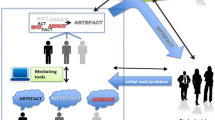Abstract
The present study investigates the interactivity between members of secondary education student groups based on three team making processes, the interpersonal relationships formed using them and their effectiveness in the students’ learning outcomes in science concepts. More specifically, the research aimed to investigate students’ opinion on three different methods used for team making, comparing groups formed based on “Group Dynamics” to groups formed based on students’ preferences and groups based on student random selection by the teacher. What is more, it aims to investigate which method they would like to form groups with and which method they think has helped them be more effective in their virtual laboratory electricity concept tasks. For the purposes of the study an intervention took place with 67 randomly selected Senior High School learners. The study employed a mixed method approach (qualitative and quantitative) using the balanced test D.I.R.E.C.T. to assess students’ learning outcomes, observation and note-taking, students’ self and peer-assessment, three student focus groups discussion and twelve students’ personal interviews to assess students’ social skills and opinion on the effectiveness of experimental teaching and sociometric techniques. The findings indicate positive results on students’ cognitive level, whereas the learners who used Group Dynmics displayed better cognitive results than the rest of the groups.
Access this chapter
Tax calculation will be finalised at checkout
Purchases are for personal use only
Similar content being viewed by others
References
Marshall, J.A., Young, E.S.: Pre-service teacher’s theory development in physical and simulated environments. J. Res. Sci. Teach. 43(9), 907–937 (2006)
Hofstein, A., Lunetta, V.N.: The laboratory in science education: foundations for the Twenty-First Century. Sci. Educ. 88(1), 28–54 (2004)
Tsihouridis, C., Vavougios, D., Ioannidis, G.S.: The timeless controversy between virtual and real laboratories in science education - “And the winner is…”. In: International Conference of Interactive Collaborative Learning and Engineering Pedagogy, (ICL), Kos, Greece, 25–28 September2018 (2018)
Chinn, C.A., Malhotra, B.A.: Epistemologically authentic inquiry in schools: a theoretical framework for evaluating inquiry tasks. Sci. Educ. 86(2), 175–218 (2002)
Baser, M., Durmus, S.: The effectiveness of computer supported versus real laboratory inquiry learning environments on the understanding of direct current electricity among pre-service elementary school teachers. Eurasia J. Math. Sci. Technol. Educ. 6(1), 47–61 (2010)
Felder, R.M., Brent, R.: Cooperative learning. In: Mabrook, P.A. (ed.) Active Learning: Models from the Analytical Sciences. ACS Symposim Series, vol. 970, pp. 34–53. American Chemical Society, Washington (2007)
Kvarnstrοm, S.: Difficulties in collaboration: a critical incident study of interprofessional health care teamwork. J. Interprof. Care 22(2), 191–203 (2008)
Roberts, T.S., McInnerney, J.M.: Seven problems of online group learning (and their solutions). Educ. Technol. Soc. 10(4), 257–268 (2007)
Coie, J.D., Dodge, K.A., Coppotelli, H.: Dimensions and types of social status: a cross-age perspective. Dev. Psychol. 18(4), 557–570 (1982). https://doi.org/10.1037/0012-1649.18.4.557
Estevez-Lopez, E., et al.: Aggressive and non-aggressive rejected students: an analysis of their differences. Psychol. Schools 43(3), 387–400 (2006)
Cadwallader, T.W.: Sociometry reconsidered: the social context of peer rejection in childhood. Int. J. Action Methods 53(3), 99–118 (2000)
Kalkan, M., Epli-Koç, H.: Perceived social support from friends as determinant of loneliness in a sample of primary school. US–China Educ. Rev. 8(4), 547–551 (2011)
Garcia-Magarino, I., Lombas, A.S., Plaza, I., Medrano, C.: ABS-SOCI: an agent-based simulator of student sociograms. Appl. Sci. MPDI 7(11), 1126 (2017)
Drahota, A., Dewey, A.: The sociogram: a useful tool in the analysis of focus groups. Nurs. Res. 57, 293–297 (2008)
Zafiri, I.: Research for the improvement of the relationships and the interactions between students of a school classroom with the use of a digital game for educational purposes, Master Thesis, Kapodistrian University, Athens (2016)
Contandriopoulos, D., Larouche, C., Breton, M., Brousselle, A.: A sociogram is worth a thousand words: proposing a method for the visual analysis of narrative data. Qual. Res. 8(1), 70–87 (2018)
Sobieski, C., Dell’Angelo, T.: Sociograms as a tool for teaching and learning: 18 discoveries from a teacher research study. Educ. Forum 80(4), 417–429 (2016)
Leung, B.P., Silberling, J.: Using sociograms to identify social status in the classroom. Calif. School Psychol. 11, 57–61 (2006)
Engelhardt, P.V.: Examining Students’ Understanding of Electrical Circuits Through Multiple-Choice Testing and Interviews. Thesis, North Carolina State University (1977)
Andrade, H.L., Valtcheva, A.: Promoting learning and achievement through self-assessment. Theory Pract. 48, 12–19 (2009)
Noonan, B., Duncan, R.: Peer and self-assessment in high school. Pract. Assess. Res. Eval. 10(17), 1–8 (2005)
Author information
Authors and Affiliations
Corresponding author
Editor information
Editors and Affiliations
Rights and permissions
Copyright information
© 2021 The Author(s), under exclusive license to Springer Nature Switzerland AG
About this paper
Cite this paper
Tsihouridis, C., Petrou, N., Batsila, M., Vavougios, D. (2021). Optimizing Experimental Science Learning Outcomes Through the Inquiry Based Method and Team Making Using a Sociometric Software Tool. In: Auer, M.E., Rüütmann, T. (eds) Educating Engineers for Future Industrial Revolutions. ICL 2020. Advances in Intelligent Systems and Computing, vol 1328. Springer, Cham. https://doi.org/10.1007/978-3-030-68198-2_4
Download citation
DOI: https://doi.org/10.1007/978-3-030-68198-2_4
Published:
Publisher Name: Springer, Cham
Print ISBN: 978-3-030-68197-5
Online ISBN: 978-3-030-68198-2
eBook Packages: Intelligent Technologies and RoboticsIntelligent Technologies and Robotics (R0)




